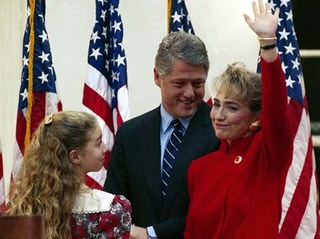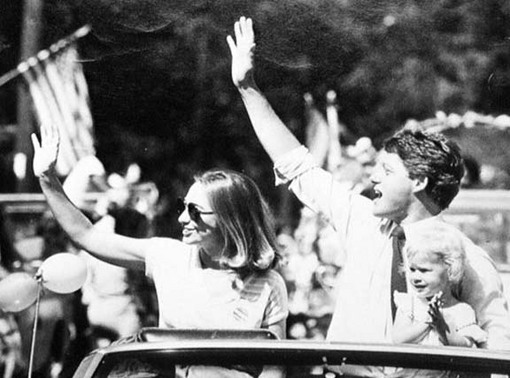
"Clinton" premieres in two parts: Monday, February 20th and Tuesday, February 21st on PBS's "American Experience" (check local listings for showtimes) and will be available thereafter via PBS on demand. Also on DVD and iTunes.
I should probably state up front that I was, and always will be, a Clinton supporter. Like our 42nd president, I grew up in a home where John F. Kennedy had been revered as a young, dynamic force of change and hope for the future. When you admire a politician's core conviction, it's at least somewhat easier to overlook, if not forgive, their foibles and shortcomings. As a young quadriplegic in 1991, I saw candidate Clinton as an impressive-enough carrier of JFK's torch, a protector of the disadvantaged who had inherited Jack and Bobby Kennedy's concern for those who found the American dream elusive or entirely out of reach.

That concern was clearly demonstrated by the defining moment of Clinton's presidential campaign. It's one of many pivotal moments captured in the two-part, four-hour documentary "Clinton," the 16th episode of PBS's "American Experience" presidents series. At the second presidential debate in Virginia in 1992, a young African-American woman in the audience asked candidates Ross Perot, Bill Clinton, and incumbent president George H.W. Bush a question that was then on the minds of struggling Americans everywhere:
"How has the national debt personally affected each of your lives, and if it hasn't, how can you honestly find a cure for the economic problems of the common people if you have no experience in what's ailing them?"
That question could easily be recycled as a present-day jab at Mitt Romney, but let's stick to history: Bush simply didn't understand the question, and Clinton seized the opportunity to ensure his victory. Stepping toward the audience in a characteristic display of the sincerity that had propelled his fast-moving career, Clinton demonstrated a concise, compassionate grasp of the question's meaning, and his answer (a reference to the poverty and middle-class struggle he witnessed while campaigning for Congress and Governor in his native Arkansas) left Bush with a classic expression of election-losing dismay.

We all know where history led Clinton (and us) from there: William Jefferson Clinton presided over two terms and eight years of unprecedented economic growth and recovery, creating a balanced budget and even a surplus that is all but unimaginable in our current political climate. We also know that Clinton's presidency was constantly plagued by controversy: Early in the campaign he was exposed as would-be draft-dodger (although it was a high draft-lottery number that eventually prevented his conscription); he "didn't inhale"; he was known as a smooth and canny prevaricator, nicknamed "Slick Willy"; he was weak on foreign policy and faced earth-shattering crises in Somalia, Rwanda and Bosnia; both he and his wife Hillary were haunted by Ken Starr's perpetution of the Whitewater land-investment scandal, a seemingly endless "non-story"; and, most notoriously, he had a reputation as a chronic womanizer who simply couldn't keep his zipper shut, resulting in a string of so-called "bimbo eruptions."

Written and directed by Barak Goodman and narrated by Campbell Scott, "Clinton" addresses all of these controversies with unflinching clarity, and the Monica Lewinsky scandal is, by necessity, a lengthy centerpiece of Part 2. But the image of Clinton that ultimately emerges is that of the perpetual "Comeback Kid," which serves as the title of Part 1. As former White House press secretary Dee Dee Meyers observes, regarding the Lewinsky scandal and Clinton's public apology for lying about it: "He disappoints them [the public] every time, on some level, but he always gets up and tries to make it better. What else can you ask from a sinner? The American public is pretty forgiving of a guy who sees himself as a sinner."

A central theme of "Clinton" is the 42nd president's capacity to rise above political mistakes and personal scandals to earn the kind of redemption (still hotly debated) that's typically reserved for those who repeatedly refuse to give up. When Hillary Clinton's historic health care bill was resoundly defeated in 1994, and the president subsequently lost his Democratic House and Senate to Republican Speaker of the House Newt Gingrich's phenomenally successful midterm crusade against "the liberal welfare state," it appeared that Clinton's power had been irrevocably lost. But as journalist and "Primary Colors" author Joe Klein observes at the end of Part 1, "There was no doubt that Bill Clinton could come back or would come back. Bill Clinton was constitutionally incapable of not coming back. The real question was how, and in what form?"

As a profile of youthful ambition, campaign-trail tenacity and a strong, politically powerful marriage defined by Hillary's remarkable tolerance of Bill's habitual infidelities, Part 1 of "Clinton" establishes the personal and political context that turns Part 2 ("The Survivor") into the depiction of an initially awkward leader who finally came to inhabit his presidency. In his first two years in office he'd angered supporters with a too-soft penchant for compromise and was dismissed by detractors as "a charming hick." We see a deflated Clinton ill-advisedly defending his relevancy in public (the low point of his first term) but scrutinizing his mistakes and steadfastly refusing to fail. His advances in foreign policy, the rise of what became known as The Clinton Doctrine, and especially his forceful reaction to the Oklahoma City bombing, placed Clinton in a position to defeat Gingrich's government shutdown during a heated stalemate over balancing the budget. His second term was thus ensured, "some believed by selling his soul," narrates Campbell, "and others by regaining it."

Although "Clinton" is definitive portrait, it's also largely humorless (despite a great clip of Clinton's image-saving appearance on Johnny Carson's "The Tonight Show" after his dull, rambling speech at the 1988 Democratic Convention) and frustratingly rigid as a straightforward chronology of Clinton's early career and eight-year presidency. Despite dozens of talking-head interviews with close friends, advisors, journalists, biographers, and many top-level members of the Clinton administration, psychological insights (like those found in the historical writings of Doris Kearns Goodwin and others) are avoided in favor of a just-the-facts timeline. We can fill those introspective gaps ourselves by interpreting the many photos and film clips that show Clinton's varied expressions of despair and triumph, but those images grow increasingly repetitious until "Clinton" starts to look like a photo montage of presidential misery.
And yet, with unprecedented access to Team Clinton and a broad spectrum of experts (not counting noteworthy absentees like former White House communications director George Stephanopoulos, former Vice President Al Gore, Gingrich and others), "Clinton" rises above its own shortcomings to become a comprehensive and respectably non-partisan reminder that Bill Clinton, for all of his faults, was and still is a man who thrives on public service.

In a quiet, backstage kind of way, "Clinton" is also about one of the most remarkable wives in American political history. When we see an early photo of Bill and Hillary during their first blush of romance, it's startling to see the handsome Bill, bushy-haired and bearded, looking every inch like a hippie-ish college stud who could woo women at the drop of a hat, and frequently did. And there's young Hillary, her smile equally wide, thrilled to support, nurture, and parallel her husband-to-be's nascent political ambitions. They were (and still are) a deeply bonded couple, and Hillary's stoical endurance, along with her own stellar achievements in politics, show her to admirable advantage alongside her illustrious and recklessly cheating husband.


It's entirely reasonable for former Republican senator Trent Lott to express dismay over Clinton's political recovery after scandal, dishonesty, and impeachment marred the president's reputation. Likewise, it's unlikely that "Clinton" will sway anyone's established opinions regarding Clinton's controversial presidency. If you think Bill Clinton was a devious liar and a philandering phony who was always "one step ahead of the posse" (a popular sentiment among Clinton's opponents), this film probably won't change your mind, even as it deepens your appreciation of the man's dynamic career.

But if you found something to admire in Clinton's presidency, or if you tallied up his achievements and found them to be more significant than the scandals that rocked his White House, you have to agree with Joe Klein, who gets both first and last words in "Clinton": "A lot of people think that Clinton's presidency was a lost opportunity, but he came to office in 1992 and left a stronger country in 2000. I don't know if you can say, of a president who served us well and improved our material good, that it was a wasted opportunity. And it was sure a lot of fun to watch."
Watch Clinton Preview on PBS. See more from American Experience.
Watch Clinton Chapter 1 on PBS. See more from American Experience.
Watch Clinton's First Lady: Hillary on PBS. See more from American Experience.
Watch Clinton and Crisis: The Oklahoma City Bombing on PBS. See more from American Experience.
_ _ _ _ _

A Seattle-based freelancer, Jeff Shannon has been writing about film and filmmakers since 1985, for the Seattle Post-Intelligencer (1985-92) and The Seattle Times (1992-present). He was the assistant editor of Microsoft's "Cinemania" CD-ROM and website (1992-98), where he worked with rogerebert.com editor Jim Emerson, and was an original member of the DVD & Video editorial staff at Amazon.com (1998-2001). Disabled by a spinal cord injury since 1979 (C-5/6 quadriplegia), he occasionally contributes disability-related articles to New Mobility magazine, and is presently serving his second term on the Washington State Governor's Committee on Disability Issues and Employment.





